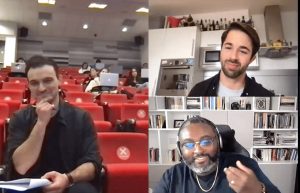
DeepMind experts visit our AI, Disruptive Technologies and the Law Year 3 class.
Last week, we welcomed Iason Gabriel and William Isaac from DeepMind’s AI Ethics and Society Team at Goldsmiths (virtually). William and Iason joined our ‘AI, Disruptive Technologies and the Law’ Year 3 class—to talk about their cutting-edge research on AI ethics, fairness and governance, and to answer our students’ questions.
DeepMind is one of the world’s leading AI companies, responsible for various innovative products such as AlphaGo (which beat former Go champion Lee Se-dol 4-1) and AlphaFold (AI designed to solve protein folding, one of the grandest challenges in science). DeepMind’s Ethics Team in particular, where William and Iason are senior research scientists, deals with the key ethical challenges raised by AI—its goal is to build safe, accountable and socially beneficial AI that works for all. William is an expert in the areas of fairness and governance of AI, and his work has been featured in leading publications including Science and the New York Times. Iason is a political theorist and philosopher, with expertise in AI ethics and distributive justice, whose work has been featured in Nature and recent European Parliament reports on AI.
In this session, Iason and William talked about their fascinating work in the area and discussed two of their recent papers with our students: ‘Decolonial AI: Decolonial Theory as Sociotechnical Foresight in Artificial Intelligence’; and ‘Artificial Intelligence, Values, and Alignment’. These articles aim to address a range of complex socio-economic challenges posed by AI—we reflected on decolonial theory in the context of AI and the key question of addressing algorithmic oppression, exploitation and dispossession through responsible and fair AI governance. We discussed the challenge of building ethically-aligned AI systems and the normative framework necessary to achieve this, emphasizing the importance of establishing a fair, robust and genuinely inclusive process for identifying such principles.
The session thus exposed our Law students to world-leading research on AI ethics and governance and allowed them to reflect on the future of artificial intelligence more generally.
Goldsmiths Law’s Dr Plamen Dinev, a leading expert on the relationship between the Law (particularly Intellectual Property law) and technology is teaching and coordinating the AI, Disruptive Technologies and the Law module, which embeds a number of thought-provoking encounters with industry experts and academics.